Science and Research
For the past 20 years, Canine Companions has been the pioneer in canine research, setting the path and leading the service dog industry to success. Take a peek at what the Canine Companions Science and Research team is studying! Our team of researchers are working to actively support not only the mission of Canine Companions, but also the service dog community, as a whole. By studying canine cognition, health and genetics, it is our goal to improve the success of service dogs and the dogs’ impact on their handlers.
Canine Behavior and Cognition Studies - A Chronological History
2002: First publication
First abstract published on the behavior of Canine Companions dogs and the benefits of facility dogs in a hospice setting
2006: CBARQ
Canine Companions becomes the first service dog organization in a collaborative effort to use a behavioral questionnaire developed by the University of Pennsylvania to look for associations between success vs release of service and guide dogs
2011: Adult Dog Cognition
Duke University teams up with Canine Companions and is the first to evaluate the cognitive skills of service dog candidates in professional training using the Dog Cognition Test Battery
2014: fMRI
With Emory University, Canine Companions is the first and only service dog organization to explore using fMRI technology to look at changes in brain activity in an awake dog as a window into their suitability for service work
2016: Puppy Cognition
Researchers from the University of Arizona and Duke University created and implemented a series of cognitive tasks for 8-to-10-week-old puppies, known as the Dog Cognitive Development Battery
2017: Maternal Style Study
In a 5-year study examining the effects of the early days with their mother, 59 dams and their litters were observed from birth. Puppies were subsequently cognition tested and followed over the course of development
2018: Duke Puppy Kindergarten
In the first program of its kind, Duke welcomes the first class of Puppy Kindergarten. Canine Companions puppies are raised for the first few months on a college campus and their cognitive skills are assessed weekly
2021: Heritability of Traits
Using information about relatedness and each puppy's performance on our cognitive tasks, we have been exploring how much of the variation in our dogs can be explained by their genetics
2022: Dog Cognitive Aging
In partnership with the University of Arizona and The Dog Aging Project, Canine Companions develops a series of tasks, focused on memory and impulse control, to investigate cognitive aging in dogs and the factors that affect it
Cognition & Behavior
Understanding how dogs think and behave helps us support dogs in their many jobs in society, from being a part of the family to enhancing independence for people with disabilities. One of the research goals of Canine Companions is to better understand which traits lead to a successful service dog. We study dogs’ cognition and how they problem solve, and how these abilities develop and change over time. We also connect how dogs’ individual experiences and genes contribute to these skills. Through our collaborations with university and industry research programs, we are expanding our knowledge of canine wellness and cognition, as well as the formation of the human-animal bond.
Highlights:


Training a puppy? Here’s when they’re able to learn key skills
At Duke’s Puppy Kindergarten, researchers are learning when and how pups’ brains develop.
Understanding these cognitive milestones could help humans raise better dogs.
Click here to read the full article.*
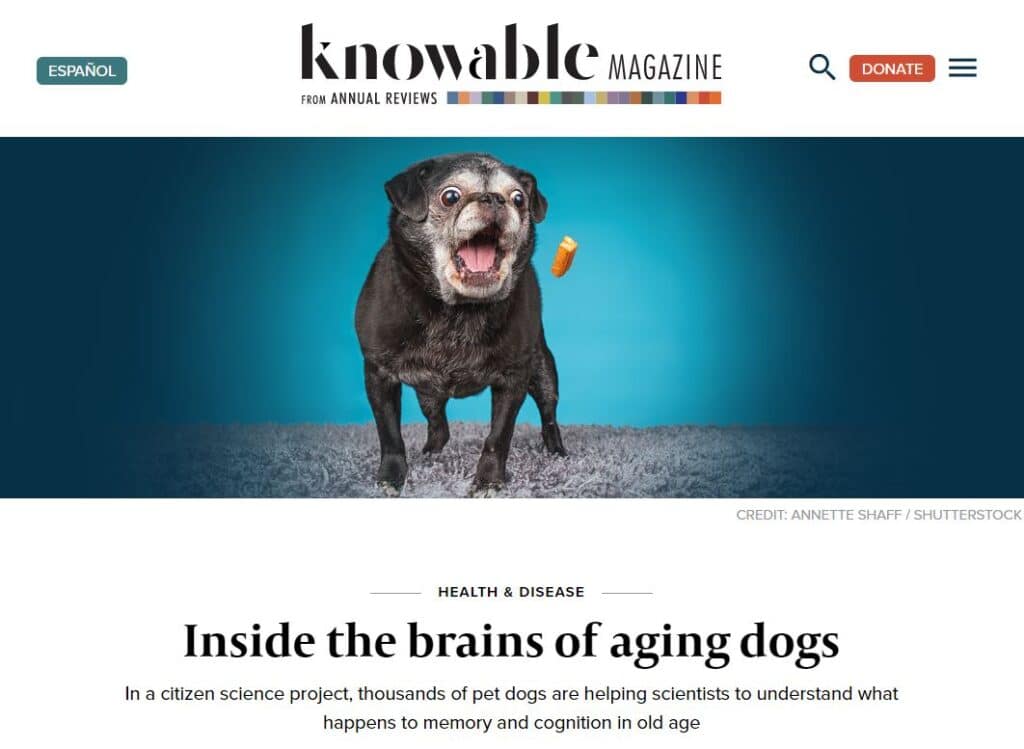
Inside the brains of aging dogs
In a citizen science project, thousands of pet dogs are helping scientists to understand what happens to memory and cognition in old age
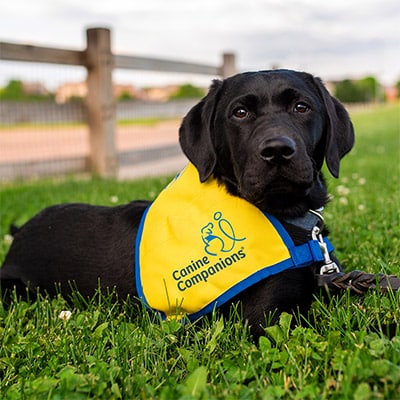
Partnering with Harvard on the Dog Life Experience Study
Canine Companions collaborates with multiple universities to conduct top-notch research on canine health and behavior. Our goal is to better understand which traits lead to a successful working dog.
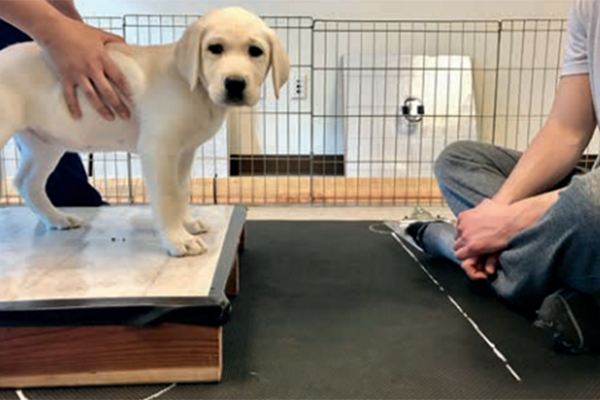
Helping Explain Why Dogs Understand Human Communication
Dr. Evan MacLean, director of the Arizona Canine Cognition Center at the University of Arizona, is exploring ways to identify the best dogs for different jobs – before they start the long and expensive training process — by looking at their cognitive abilities.
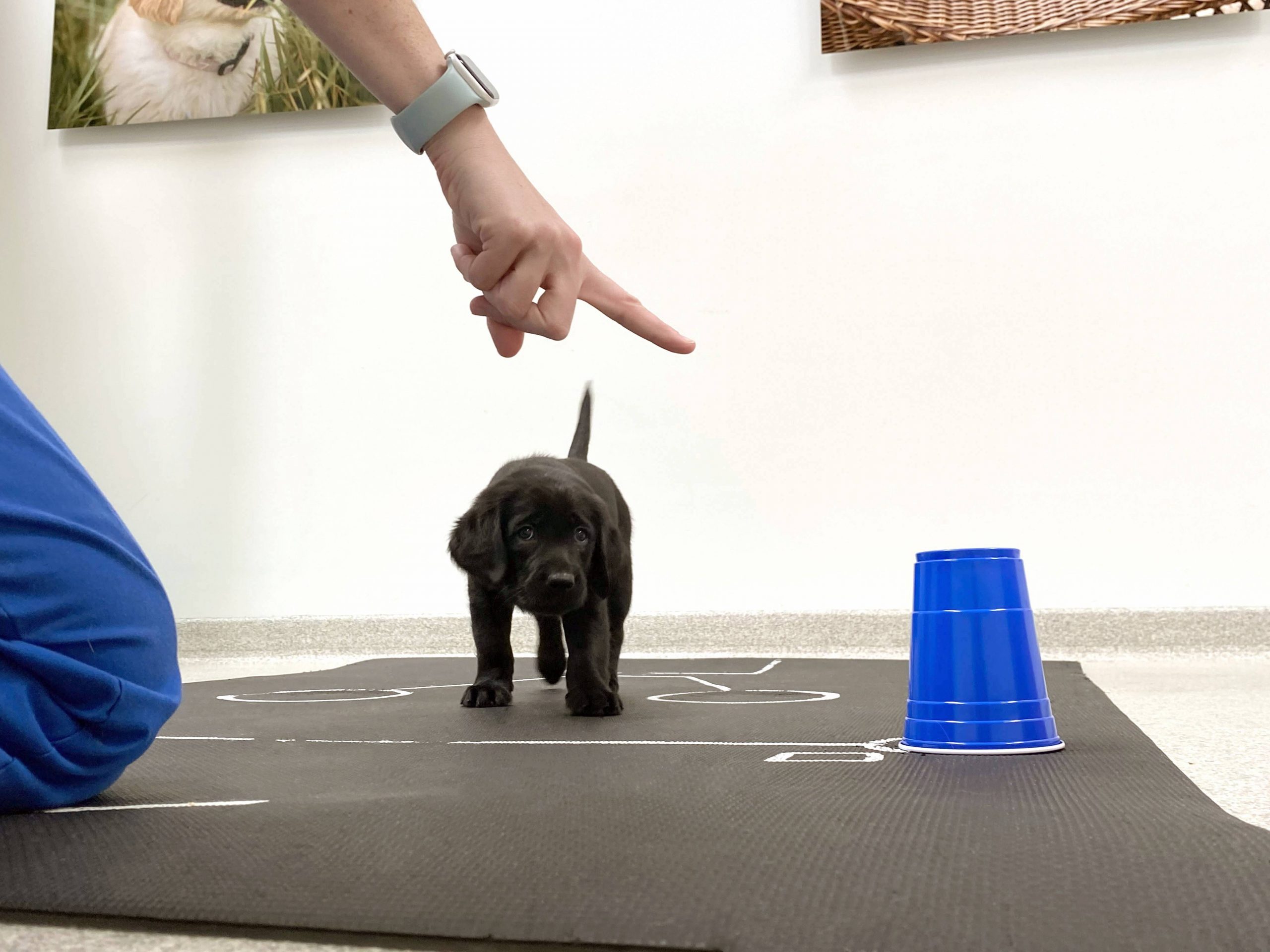
Canine Cognition and Heritability
Canine Companions collaborates with multiple universities to conduct top-notch research on canine health and behavior. Our goal is to better understand which traits lead to a successful working dog.
Health & Nutrition
A nutritionally complete diet is essential to a dog living a healthy and happy life. Studies increasingly show that balanced age-appropriate diets and a healthy weight are key to preventing and managing disease. Canine Companions has participated in multiple collaborative studies looking at nutrition and how it impacts dogs, many with a focus on diets and supplements for dams and puppies. These studies, some which are ongoing, have included assessments of the properties of milk for young puppies, microbiome development in puppies, and the impact of supplements on brain development and immune function. It’s critical to get puppies off to a good start to help ensure they will have strong minds and bodies as they start their journey as future service dogs!

Formulating a Food to Help Puppies’ Immune Systems
Canine Companions launched a study in 2022 with Royal Canin and Waltham Petcare Science Institute on the efficacy of an enriched diet for puppies.

The Right Supplements for Pregnant Dogs Helps Puppies Become Service Dogs
Giving pregnant dogs supplements high in DHA helps increase the rate that a dam’s puppies go on to become service dogs.
Impact of Service Dogs
Canine Companions paves the way in the service dog industry by studying the impact of service dogs on people with various disabilities and their families. By better understanding the needs of our clients and how a dog is most useful to them, we can raise, train and select service dogs that will support them best to lead more independent lives.
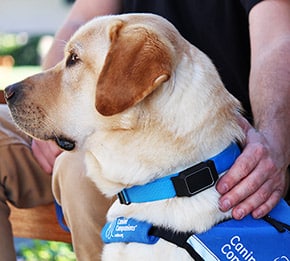
CanineAlert™: New Patented Wearable Technology Provides Support to People with Disabilities
Developed in-house with collaboration with experts in the field, the patented CanineAlert™ Device uses biometric data, monitoring the wearer’s heartrate through wearable technology that wirelessly communicates with the service dog’s collar device.

Science and Research – The Impact of Service Dogs on Veterans Living With PTSD
Canine Companions partners with University of Arizona for a pivotal study on service dogs aiding veterans with PTSD, aiming to scientifically prove the benefits
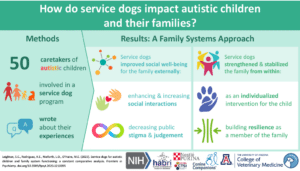
A Look at the Family-wide Benefits of Service Dogs in Autism Care
A new study found that service dog placements enhanced and increased social connections for the family of autistic children as a whole, and decreased experiences of judgement and stigma.

Poorly Trained Service Dogs – The Impact on Trained Service Dog Teams
This white paper examines the impact of poorly trained dogs in public places on task-trained service dogs. Canine Companions spearheaded the collection of data from service dog users whose dogs were trained by Assistance Dogs International (ADI)-accredited training programs.

Wallis Annenberg PetSpace Leadership Institute Fellows Suggest Ways to Improve Selection and Performance of Working Dogs
Members of the Wallis Annenberg PetSpace Leadership Institute* published a paper this week entitled “Enhancing the Selection and Performance of Working Dogs”* in the international peer-reviewed journal, Frontiers in Veterinary Science.
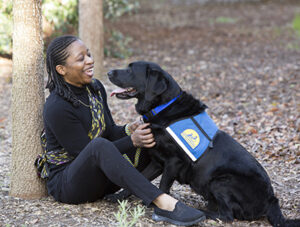
VA Study Shows Service Dogs help Veterans with PTSD
The results of an important research study completed by the Department of Veterans Affairs (VA) shows significant benefits from service dogs for veterans with post-traumatic stress disorder (PTSD).
*Please be aware that by clicking this link, you are visiting sites that are not managed by Canine Companions. Website security, accessibility and privacy policies may be different than Canine Companions policies. Please read their policies closely.




